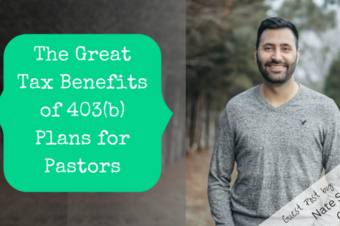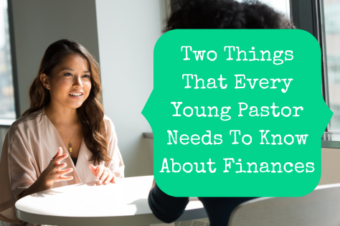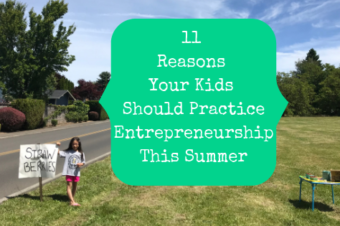People over 50 are eligible to make extra contributions to their 403(b) plans. However, some plans even let younger people make extra contributions. Here is everything you need to know regarding eligibility, limits, etc. for making extra contributions to your 403(b).
How To Start A Side Business For Pastors: 5 Simple Steps
Side business, side gig, tent-making ministry, side hustle, part-time self-employment, side job; doing some extra work on top of your regular job has a lot of different names these days. No matter what you call it, a lot of pastors (and their spouses) see it as a good way to provide for their families when serving in a position that doesn’t pay quite enough.
We have discussed different ideas for side jobs for pastors on this blog previously and even took an in-depth look at how one pastor’s wife has used Airbnb to augment her husband’s pastoral salary. We also spent some time discussing the ethics of pastors and business and how to maintain boundaries between your business and ministry.
Today we’re going to get really practical. How do you actually go about starting your own little business on the side?
1. Pray
I know this should go without saying, but I know from time to time we all let our human nature take over and jump into things without really seeking God’s will on the matter. Like Psalm 127:1 says, though, “Unless the Lord builds the house, the builders labor in vain.” We all know this.
Before you get started, spend some time in prayer. Make sure it’s really a God-idea and not your flesh or insecurities driving you to start your own business. Then, in each step of the process below, make sure you are taking it to God for his wisdom and guidance.
2. Gather & Research Ideas
Once you get the green light from God, start brainstorming ideas. Here are some that I came up with that would be able to work around a pastor’s schedule. Here are some that are specific to the Christmas season. You can also google “side job ideas” and get 802,000,000 results in half a second.
As you come up with ideas, look for things that:
- Can work around your pastoral schedule
- Will not create conflicts of interest or ethical dilemmas
- You would enjoy at least somewhat (it doesn’t have to be your greatest passion but you shouldn’t hate it)
- There are easily identifiable people willing to pay for it
- You will be able to earn enough to make the time and effort worthwhile
After you have a couple of ideas that excite you, do some research. The internet is chock full of information from personal experiences of people who have done that job to information on how the job pays, how much competition there is for it, and ideas for how to be successful doing it. In addition to researching your ideas online, seek the advice of experienced business people that you know. As Proverbs says, there is safety in a multitude of counselors.
3. Build A Plan For The Best Idea
The next step is to pick the best of your ideas based on your research and God’s guidance and then develop a detailed plan for how you’ll transform it from a thought into reality. As you get into the details, you’ll probably have to do even more research.
Things to include in your plan are:
- What exact products or services will you offer?
- What resources will you need?
- Where can you get those resources?
- How much time are you going to need to commit (and when)?
- How much money will it require?
- Who are you going to market to?
- How are you going to market to them?
- Are there any legal requirements to conduct this business?
4. Start With A Minimum Viable Product
Now it’s time to get started and actually see if this idea is going to work. It’s not time to “go big or go home,” though. You want to start small to make sure you’re on the right track. You want to start with just enough to be able to analyze the viability of your idea, called a “minimum viable product” in the business world.
If you want to get into landscaping, instead of going out and putting $8,000 worth of tools on your Home Depot card, start with just a lawnmower. Mowing lawns is enough for you to see if you will enjoy the work, if there are enough people willing to hire you, and if you will be able to earn enough to make it worth the effort. If it works out for you, it’s easy to scale up. But, if it doesn’t work out, you haven’t wasted a lot of time or effort discovering that.
5. Analyze & Refine
As I just said, you’re allowed to change your mind, even after you’ve picked an idea. It’s wise to analyze and refine the business as you go. You may only make small tweaks to your plan from Step 3 or you could decide to toss out the business idea altogether and start over at Step 1.
Every step of the way it’s important to pause and reflect on how the business is going. Take some time to look at how the business is doing financially, if there is enough of a market for it to continue and grow, if your product or service can be improved and how, how you feel about doing the work itself, and how it is affecting your family and ministry. Take stock of where you are and the potential for where you could go and don’t be afraid to make course corrections.
When it all comes down to it, running a business isn’t a whole lot different than running a ministry. It needs to be fluid. You need to always be adjusting, growing, improving, and listening to the voice of the Holy Spirit for direction.
11 Reasons Your Kids Should Practice Entrepreneurship This Summer
Here in the Pacific Northwest, it is strawberry season. For most of us, that means we get to chow down on juicy berries that make us avoid the bland store-bought strawberries for several months afterward. For my daughter, it means business. Literally, business.
The minute the signs go up for the U-pick strawberry field near our house she starts asking when she can sell strawberries. You see, rather than just eating them, she likes to pick them and then set up her own stand by the side of the road to resell them. Yes, that’s her in the picture above.
It’s funny because at 5 she doesn’t seem to really care about money. Until strawberry season. Then, it’s all about earning money.
I think it’s a good thing. There are a lot of important life skills and lessons she’s learning as she sits in that field selling her wares. I think every kid should experiment with entrepreneurship, whether it’s babysitting, selling berries, pressure washing sidewalks, or something else. Here are some of the benefits of childhood entrepreneurship that my daughter and I came up with:
Practice Math Skills
When customers see how old my daughter is, they always want to test her math skills. If it costs $4 and I give you $5, what’s the difference?
I can’t blame them, though, because I do the same thing. It’s a great chance for her to practice that math that she’s been learning all year in kindergarten. Kids of all ages get a chance to put their math into practice when working with money. It’s good for them to see that there’s more to math than just endless worksheets.
Learn To Count Money
Working with money also gives them a chance to practice counting it. This is especially good for younger children who still see no more value in a $20 bill than a $1 bill. If you throw some coins in there, then the lesson gets really good. My daughter said that it’s important to learn to count money because “when you’re older you need to know how much you have.” She’s got a point.
Develop People Skills
One of the things that even trips up adults is that in order to make money, you need to interact with people. Entrepreneurship is good for your people skills no matter what age you are. Several years ago a neighborhood boy came to my door soliciting pressure washing and I was so impressed with how professionally he spoke to me and explained his services that I hired him on the spot.
If your kids have the opportunity to learn to talk to adults and explain their goods or services, it will only benefit them in the years to come. My daughter is young, so she is just learning to not be shy and look at people when she speaks to them. Older kids will have to rise to a different level of communication and sophistication of people skills, which is good for them.
Face & Overcome Fears
This one is closely tied with the last one because a lot of kids (and adults) are afraid of talking to people. But, like I said, in order to earn money you have to face your fears and interact with people. My daughter was a great example of this last year.
All spring she was scared to death of bees and wouldn’t look at or talk to anyone, even our next door neighbor whom she loves. However, when strawberry season came around, she spent hours sitting in a field full of bees and talking to strangers. I was so impressed with how she rose to the challenge and overcame her fears. Sometimes I wish I could be more like her.
Experience The Relationship Between Money & Work
Second Thessalonians 3:10 says that if you don’t work, you don’t eat. The concept that nothing is free and you have to expend effort in order to get a reward is being lost in our current culture. To me, the most appalling part of the Green New Deal that is being floated around is that they demand a living wage for anyone who is unable or unwilling to work. Yes, you should receive a living wage for doing nothing even if you’re perfectly able to work. Wouldn’t that be wonderful?
Unfortunately for some, the real world doesn’t work that way. If you want something, you have to work for it. There is a relationship between work and money and the sooner our kids can learn that the better our entire society will be.
Learn How Business Works
I studied business in school, so I’m a little biased, but I think everyone should learn about business. If you have a young adult going off to college that doesn’t know what he or she wants to study, have them study business. It is applicable to anything you do in life.
Going to work in a bank? You need to understand business. Going to be a professional artist? You’ll really need to understand business. Going to be a pastor? A lot of business principles still apply in the church (accounting, anyone?) even if some of your motivations differ.
Setting up their own little business will give kids hands-on experience with how business works. My daughter has learned that in order to make money, you need to have something (a good or service) that people want enough to pay money for it. To get that good or service you will need to either work hard for it or buy it. And then to make a profit, you need to charge more for it than it cost you.
This knowledge will help her later in life when she starts getting credit card offers in the mail. No, being pre-approved is not a special privilege because you are spectacular and unique. They are trying to sell you their product, a credit card, because statistics show that they will probably make money off of you. Lots of money.
Understand Economic Systems
As I mentioned above, you can’t sell a good or service if no one wants it. There has to be a demand for your product. And you can’t just charge anything you want. My daughter would have loved to have charged $50 a pint for her strawberries, but then no one would have bought any. She’s not that cute.
Supply and demand are basic economic principles that can sometimes be hard for kids to wrap their minds around until they live them out. Starting a business is an excellent way for kids to learn about economic systems by living them.
Learn To Tithe
My daughter can be incredibly generous most of the time, but not always. Every once in a while it’s like running into a brick wall and there’s no way around it, she simply won’t let go. When I brought up tithing in that field as we waited for customers I ran into the brick wall.
I had to use my entire Bible college education to try to persuade her that it’s worthwhile to give God 10%. It’s incredibly painful for her to think of parting with $3 of her hard-earned money but it will only get harder as she gets older and earns more and more. I think it’s very important to teach children generosity and tithing at a young age and the best way to do that is for them to start earning their own money.
Improve Prayer Life
When we were near the end of our berries and there were no customers coming, my daughter resorted to prayer. It was adorable to see her praying to God and asking him to send us customers. I think she was also trying to make a deal where her tithe was contingent on him sending customers, but hey, at least she’s starting on the right foot.
It may sound silly, but having their own business can be really good for your kids’ prayer life. Just try it and see.
Earn Money
Here’s the most obvious benefit: your kids can earn money if they start a business. Money to pay for Pokemon cards, ice cream cones, trips to the water park, and summer camp. The more money they earn, the less money will be coming out of your pocket. It’s a win-win for everyone.
When I asked my daughter why it’s good for kids to earn money, her response was, “To buy your own toys or when you’re older a phone so someone doesn’t have to give it to you for your birthday.” Kids’ activities and desires can be expensive and it’s good for them to learn to work for what they want.
Start A Roth IRA
Finally, if your kids earn their own money then you can open Roth IRAs for them. Anyone with earned income, regardless of age, can open a Roth IRA and contribute the lesser of their earned income or $6,000 in 2019. My daughter earned $33 selling berries last week so I’m going to put $33 of my own money into a Roth IRA for her.
Why would I do that? First of all, the sooner she starts investing, the longer her money has to grow. If all she ever invests is that $33, by the time she is 67 it will have grown to almost $7,000 if she can earn 9% returns (which is likely with her time horizon). I really don’t think she’ll use it for retirement, though. More likely she’ll use it to pay for college or buy her first house.
Contributions can be withdrawn from a Roth IRA at any time tax-and penalty-free. Also, once a Roth IRA has been open for 5 years, you can withdraw up to $10,000 of earnings to purchase your first home or take out money for qualified higher education expenses tax- and penalty-free. I think having her own investment account will also be a great teaching tool for her as she gets older, even if she doesn’t have much in it.
As you can see, there are a lot of benefits, both tangible and intangible, to your kids practicing entrepreneurship this summer. Perhaps more valuable to you than any of the above, it will also combat boredom. A kid who is out earning money is not moping around the house saying they are bored and annoying their siblings.
So, what are we waiting for? Let’s get these kids to work!
Reader Story: Supplementing Pastoral Income With Airbnb
This is a guest post by Stephanie Anderson of Andersonswife.com. She and her husband, Trevin, are pastors at Mannahouse in Portland, OR.
How To Manage The Finances For Your Side Business
For more than a month now, the most popular post on Pastor’s Wallet has been Business Ideas For Pastors That Want To Make Extra Money. It seems there are a lot of pastors out there looking to entrepreneurship to finance their ministries or supplement their pastoral salaries.
In that article, I gave you some good ideas of ways to make money that can work around your ministry. But what comes next? How do you even set up a business? How do you actually manage small business finances so you know what you’re earning and don’t get in trouble with the IRS?
Side Jobs For Pastors That Offer Benefits
Health insurance.
Tax-advantaged retirement accounts.
Vision insurance.
Wellness programs.
Dental insurance.
Matching retirement savings.
Disability insurance.
Tuition reimbursements.
Life insurance.
Annual bonus incentive plans.
Child care assistance.
Discounted merchandise.
These are some of the most common benefits that employers offer these days, and the list is ever growing. In fact, they can be the deciding factor for someone accepting a job offer in today’s tight labor market.
Unfortunately, many non-denominational pastors are on the outside looking in. If their church can scrape together enough to pay them a livable salary they are blessed. But, benefits? There’s just no way.
However, a lot of the benefits that big corporations offer are still needed by pastors. You still need health insurance. It would still be a big help to be able to save for retirement in a tax-advantaged account. It would still be wise to have life insurance.
How Independent Pastors Can Access Employee Benefits
How do you get them, though? It’s not like you’re going to leave the ministry just to have an employer that will pay for those things. Is there any other way for you to get your hands on some of these popular benefits that your church can’t afford to give you?
Yes. With a part-time side job. Whether it’s you or your spouse taking on the job, it could be a great way to access valuable employee benefits without leaving your church.
Traditionally benefits were only given to full-time workers, but there are a number of companies that are now offering some of their benefits to part-time workers as well. Here are some companies and types of companies that offer benefits for part-timers, but it is by no means comprehensive. Chances are, you can find a good local company wherever you are that would be willing to offer you benefits for part-time work.
Types Of Jobs That Offer Benefits To Part-Time Workers
Unions
When I was 16, I got a job as a courtesy clerk at a local grocery store and was therefore required to join the United Food & Commercial Workers Union. I didn’t like having to pay union dues as a teenager, but they provided me with health insurance for the first time in my life.
There are many unions out there that require employers to pay benefits to workers, no matter how many hours they work. Look around your neighborhood to see what unions are present and what kinds of benefits they offer. A good place to start is the grocery store.
Medical Providers
I have a friend who just got a job with a major medical provider. As an employee there, her health insurance is practically free. Already the mother of 4 boys, she says she’s tempted to have another baby just because it would only cost her $5. It’s hard to resist a deal like that!
Whether it’s Kaiser Permanente or your local hospital, many medical providers offer health benefits to all employees, because, well, that’s what they do. Across the spectrum from medical professionals to those who work in patient services, counseling, or administration, they take care of everyone. Often it’s not just health insurance they offer, either, but pensions and tuition assistance as well. Another perk: You don’t have to call a hotline for a nurse’s advice, you can just ask a coworker!
Federal Government
Whether you deliver mail for the USPS or work as a park ranger, you can get benefits by working for the federal government. Part-time work opportunities depend upon the government agency, but they are all eligible for benefits. You can read more about the benefits available from the US Office of Personnel Management here.
Companies That Offer Benefits To Part-Time Workers
Need more specific guidance? Here is a list of companies that offer benefits for part-time work. Each one offers different benefits and has different eligibility criteria, so follow the links of the ones that catch your attention to learn more:
- Costco
- Starbucks
- Chipotle
- Nike
- UPS
- JPMorgan Chase
- Lowe’s
- Aerotek
- Macy’s
- Staples
- Activision Blizzard
- FedEx
- Home Depot
- REI
- The Container Store
- Uber
- Whole Foods
- U Haul
Now, if you or your spouse decide to take on a side-job, don’t look at it as just a way to access their benefits. God has called us to be salt and light in this world, and there’s no better way to reach people than to work side by side with them on a daily basis. You can impact the world just as much, if not more, from behind a cash register as you do from behind a pulpit.
Reader Question: What Should A Mobile Pastor Do With Extra Income?
Dear Pastor’s Wallet,
My only debt is my mortgage, a 30/5 ARM with 23 years remaining. I am saving 15% of my pre-tax income toward retirement, have an emergency fund and am saving towards large expenses like my kids’ college, a new car, etc. However, I still have some extra money at the end of the month. Should I pay down my mortgage or invest it in a brokerage account? I have been at my current post for several years and could be moved at any time. My ultimate goal is to be debt free.
What to do with extra income is a common question, and you can find many articles and opinions online. However, most are not written for pastors. They don’t take into account the pastoral housing allowance or some denominations’ practice of moving their pastors every few years.
The above question was written to me by a pastor who had done a lot of research on the pros and cons of each choice. Yet, he vacillated on the decision every month because nothing he read addressed his situation as a mobile pastor. This is how I answered him:
Ditch The Adjustable Rate Mortgage
First, I would refinance to a fixed rate mortgage. Interest rates are going up, so it is best to lock in a lower rate now before your mortgage rate adjusts higher. If you can afford it, refinancing to a 15-year mortgage will give you the lowest rates.
Over the last year, rates have gone up about a quarter of a percent, and some experts expect them to reach 5% in the coming year. The economy is strong and the Federal Reserve has been, and is expected to continue, raising interest rates regularly. That means that mortgages are only going to get more and more expensive.
Build A “Moving Fund”
Second, I would save up some money to build a “moving fund” in addition to your regular emergency fund. This would be extra money set aside to cover the expenses of moving so that you are prepared when the time comes. It should be enough to cover 3 months’ mortgage payments and moving expenses. This way, if you have to move and it takes a couple of months to sell your home, you’ll have the margin to do so.
Don’t invest your moving fund in the stock market. You don’t want to risk losing this money. Instead, put it in a money market or savings account. That way, you can count on it being there when the time comes to move.
Eliminate PMI (Private Mortgage Insurance)
Private mortgage insurance (PMI) is something your lender requires you to purchase if you have less than 20% equity in your home. It is not insurance to protect you. It is insurance to protect your lender in case you default when your house is underwater. PMI usually costs between .5% and 1% of the total loan value annually. That means that for every $100,000 that you borrow, you could be paying up to $83.33 a month in PMI.
If you pay PMI, I would use your extra money to pay down your mortgage until you don’t have to do so anymore. Usually, PMI is no longer required once you have 20% equity in your home. You can double check their specific requirements with your lender.
Pay Down The Mortgage Or Invest?
If you do the things I recommend above, then it doesn’t make a big difference what you do with your extra money.
Mortgage
If you put your money into your mortgage, you will get it back when you move. It will be tied up in an illiquid asset in the meantime, but with a “moving fund” in place, you should have enough liquid assets to last until the house sells.
It is important to note, though, that paying extra on your house doesn’t guarantee you can take a larger housing allowance. Per IRS rules, the housing allowance must be the lesser of:
- The amount you officially designated in advance;
- The amount actually used to provide the home;
- The fair rental value of the home (including furnishings, utilities, etc.).
So, if the fair rental value of your home is $1,500, you can’t take a housing allowance of $2,000 just because you’re paying extra on your mortgage. You may have to pay taxes on the extra mortgage payment, but you’ll have to pay taxes on any gains from a brokerage account as well.
Brokerage Account
Investing your money in a brokerage account makes it more easily accessible, but it doesn’t move you towards your goal of being free from debt. It isn’t a permanent decision, though. There is no reason you couldn’t change your mind, cash out your investments, and put the money towards your mortgage at a later date. The only risk is that the value of your investments can go down.
What Would I Do?
Personally, I would probably pay down the mortgage to the maximum allowed housing allowance and invest the rest of the money. That is, once I had a “moving fund” in place. If you’re not sure what to do, it’s probably safer to invest the money. Then you still have the option to change your mind at any time. Just make sure you don’t invest in overly risky investments if you think you may want to cash them out to pay off your mortgage in the next couple of years.
If you’re at the point where you’re wondering what to do with extra income, congratulations! You’re doing a great job with your finances, setting a wonderful example for your congregation, and positioning your family for financial success. I’m proud of you!
Business Ideas For Pastors That Want To Make Extra Money
Here at the Pastor’s Wallet, we’ve discussed ways of earning extra money before. However, those were more like side gigs or one-off opportunities. For a pastor who wants something more substantial and longer-term, the answer is to build a side business.


























